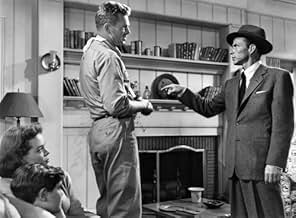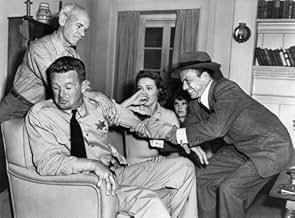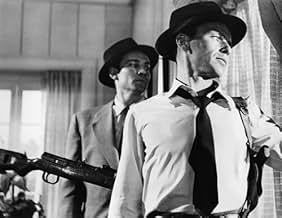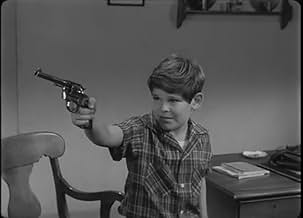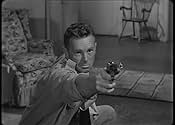IMDb RATING
6.8/10
7.6K
YOUR RATING
In the city of Suddenly, three gangsters trap the Benson family in their own house, on the top of a hill nearby the railroad station, with the intention of killing the president of the USA.In the city of Suddenly, three gangsters trap the Benson family in their own house, on the top of a hill nearby the railroad station, with the intention of killing the president of the USA.In the city of Suddenly, three gangsters trap the Benson family in their own house, on the top of a hill nearby the railroad station, with the intention of killing the president of the USA.
James O'Hara
- Jud Hobson
- (as James Lilburn)
John Beradino
- Trooper
- (uncredited)
Richard Collier
- Ed Hawkins
- (uncredited)
Roy Engel
- Driver Asking Slim for Directions
- (uncredited)
Hans Moebus
- Schultz
- (uncredited)
Ted Stanhope
- Driver Asking Tod for Directions
- (uncredited)
- Director
- Writer
- All cast & crew
- Production, box office & more at IMDbPro
Storyline
Did you know
- TriviaIn the first colorized version Frank Sinatra (Ol' Blue Eyes) was given brown eyes.
- GoofsWith the rifle locked in place, the chance of the President being exactly in line of fire is slim to none.
- Quotes
John Baron: I'm not actor, bustin' my leg on a stage so I can yell 'down with the tyrants'. If Booth wasn't such a ham he might've made it.
- Alternate versionsAlso available in a computer colorized version.
- ConnectionsEdited into Your Afternoon Movie: Suddenly (2022)
Featured review
The movie kicked up something of a fuss at the time (1954). After all, Ike Eisenhower was not only a popular president but a war hero as well. It's probably no stretch to say that, yes indeed, everybody liked Ike. So this was a pretty nervy production for the conformist 1950's. Then too, it's likely no accident that the movie was produced independently of the Hollywood studios. I doubt any studio, big or little, would have okay'ed such touchy subject matter as killing a president. But the 70 minutes does amount to an effective little suspenser, as assassins and hostages crowd into a living room perch awaiting the president's sitting-duck arrival, while the tension mounts.
The movie came along during a low point of Sinatra's career before his 1954 Oscar reversed the slump. That's probably one reason he would take on such a risky role as the thoroughly dis-likable assassin. And visually, especially, Sinatra's's quite good. As a result, when Baron says he would be nothing without his gun, Sinatra's scrawny non-Hollywood appearance confirms the fact. Just as importantly, he gives the would-be assassin the right kind of nervous edge.
There's a fairly obvious theme working through the screenplay— namely that despite pacifist wishes, violence does have a moral place in life. As events in the movie turn out, the only way to stop Baron's immoral use of violence is with morally sanctioned counter-violence. The screenplay makes the point by showing us that had Pidge gone along with Mom's anti-gun wishes, the assassination plot would have succeeded. So fortunately-- the movie implies-- when push comes to shove, Pidge follows the men in his life and the plot fails.
For Cold War audiences of the day, the political lesson is pretty clear—only guns and muscle will stop Soviet plans to destroy "The American Way". Of course, the film never identifies the authors of the plot, but I'm sure audiences came to the obvious political conclusion. It's probably also telling that guns are identified with manly men and only a frightened woman, the mother, opposes them. Mom's doubts may be understandable given her husband's violent death. However, by ignoring Mom's wishes, no matter how understandable, Pidge comes to represent a future in which gun violence and armed national defense will continue to be morally necessary. Beneath the surface, it appears, lies some pretty heavy symbolism.
Subtexts aside, Suddenly remains a gripping film even this many years later. That's pretty darn good for a cheap production using basically one set for most of the action. But, I expect it's really the touchy subject matter that continues to excite viewers and separate the film from more routine suspensers of the day.
The movie came along during a low point of Sinatra's career before his 1954 Oscar reversed the slump. That's probably one reason he would take on such a risky role as the thoroughly dis-likable assassin. And visually, especially, Sinatra's's quite good. As a result, when Baron says he would be nothing without his gun, Sinatra's scrawny non-Hollywood appearance confirms the fact. Just as importantly, he gives the would-be assassin the right kind of nervous edge.
There's a fairly obvious theme working through the screenplay— namely that despite pacifist wishes, violence does have a moral place in life. As events in the movie turn out, the only way to stop Baron's immoral use of violence is with morally sanctioned counter-violence. The screenplay makes the point by showing us that had Pidge gone along with Mom's anti-gun wishes, the assassination plot would have succeeded. So fortunately-- the movie implies-- when push comes to shove, Pidge follows the men in his life and the plot fails.
For Cold War audiences of the day, the political lesson is pretty clear—only guns and muscle will stop Soviet plans to destroy "The American Way". Of course, the film never identifies the authors of the plot, but I'm sure audiences came to the obvious political conclusion. It's probably also telling that guns are identified with manly men and only a frightened woman, the mother, opposes them. Mom's doubts may be understandable given her husband's violent death. However, by ignoring Mom's wishes, no matter how understandable, Pidge comes to represent a future in which gun violence and armed national defense will continue to be morally necessary. Beneath the surface, it appears, lies some pretty heavy symbolism.
Subtexts aside, Suddenly remains a gripping film even this many years later. That's pretty darn good for a cheap production using basically one set for most of the action. But, I expect it's really the touchy subject matter that continues to excite viewers and separate the film from more routine suspensers of the day.
- dougdoepke
- Sep 9, 2009
- Permalink
Details
Box office
- Gross US & Canada
- $1,400,000
- Runtime1 hour 17 minutes
- Color
- Aspect ratio
- 1.75 : 1
Contribute to this page
Suggest an edit or add missing content



